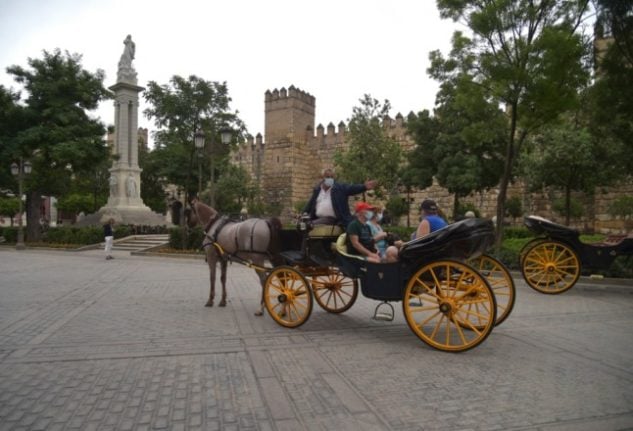For one week each year, the southern city of Seville is transformed into a colourful celebration of flamenco, music and dance, horses and bullfighting and of course, food and drink.
Women stroll around in glamourous bright flamenco dresses while men don their best togs to parade on horseback and in carriages around the city's bullring.
The fair is held every year exactly two weeks after Easter and is a time when Sevillanos dig out their finest clothes and dance their traditional dance, the Sevillana, as well as enjoy plenty of food and drink, served in traditional casetas, or huts.
READ MORE: All the fun of the fair! A guiri's guide to Spain's ferias.
What started as a livestock fair back in the mid-nineteenth century, the event has now become an enormous celebration with over one thousand casetas and a huge fairground as well as the bullfights held each evening.
This year's feria runs got underway on April 30th and continues until May 6th.
Take a look at some of the best shots from this year's celebrations:

Women outside a caseta. Photo: Cristina Quicler / AFP

Sevillanas love the traditional festival which also attracts tourists from across the world. Photo: Cristina Quicler / AFP

Dancing starts at around lunchtime and continues into the early hours. Photo: Cristina Quicler / AFP

The Feria d'Abril is a festival for all ages. Photo: Cristina Quicler / AFP
.jpg)
The Feria takes place at a huge parade ground outide Andalusia's capital city. Photo: Cristina Quicler / AFP

Women dance the traditional Sevllana wearing gorgeous ruffled flamenco dresses. Photo: Cristina Quicler / AFP
.jpg)
A bullfight is held each afternoon during the Feria Spanish matador Paquirri looks on before his last bullfight at the Maestranza bullring, in Sevilla on May 1, 2017. Photo: Cristina Quicler / AFP



 Please whitelist us to continue reading.
Please whitelist us to continue reading.